When Kris Wells, '94 BEd, '03 MEd, '11 PhD, was working on his undergraduate degree, he heard only one institutional reference to the gay community.
"It was in an adolescent psychology class. One example [in a film the instructor showed] was of a teenager who cheated on his girlfriend with another guy, and then gave his girlfriend AIDS," says Wells, assistant professor and associate director of the university's Institute for Sexual Minority Studies and Service. "The only reference was about disease and pathology."
Nearly two decades later, Wells was a key organizer of the U of A's first campus-wide Pride Week - a 10-day celebration in March that included a parade around campus, distinguished lectures and an array of campus-wide Pride banners.
The week also launched the Alumni Association's first Pride chapter and the kick-off of a $5-million campaign to expand iSMSS research and programs.
"The chapter allows alumni to support their alma mater in a way that is meaningful to them - by promoting the excellent work of our institution in the area of sexual and gender minority studies, supporting and connecting with students and coming together as a community of alumni," says Cristine Myhre, campus chapters co-ordinator.
The alumni chapter is open to all LGBTQ alumni as well as allies from the university community.
Here is a timeline of the university's evolution on Pride, politics and policies, including memories from some members of the U of A community who were there through the decades. To share more memories, contact Wells at kris.wells@ualberta.ca. For more on the Pride chapter, email cristine.myhre@ualberta.ca. (Photos: Laughing Dog Photography)
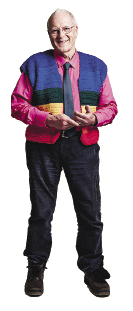
Rev. Charles M. Bidwell
Instructor, St. Stephen's College, spiritual advisor for Camp fYrefly, retired Faculty of Medicine instructor
"I joined the Faculty of Medicine in the mid-70s and knew nothing about any other LGBTQ faculty or staff.… Sexual orientation and rights for non-heterosexuals was never mentioned - as if it either wasn't believed to exist or was so taboo that it was all underground and confined to anonymous encounters in washrooms."
The following year, Bidwell spoke openly of his sexuality on CBC. He was embraced by his peers, and he was asked to offer an elective on sexual orientation for med students, which remains part of the curriculum.
"I have been very pleased with the progress of the last decade. St. Stephen's College a few years ago voted to publicly proclaim the college's welcoming of people of all orientations and gender identities. Maybe the next step is to adopt unisex washrooms such as U Vic has, with all stalls and no entrance doors, to accommodate people transitioning or transgendering."
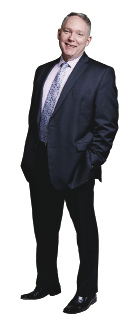
Christopher Michell-Viret, '83 BSc, '84 BSc(Spec Cert), '89 MSc
Michell-Viret's support system in the 1980s was informal student gatherings in the rocking chair lounge in HUB. "There was a lot of tension with campus security. They would ask for your name and ID number, sending a clear message that this was not supported. There were, equally, no signs of support at provincial or civic levels."
In 1996, Michell-Viret's partner was diagnosed with Lou Gehrig's disease. With his employer unable to make accommodations, he took a position at the U of A, which extended benefits to his partner. "In the '80s and '90s, the university changed remarkably, and continues to serve as a beacon for change.
"The Pride chapter is a coming of age for the U of A. The timing is right to invite members of the community who have distinguished themselves at the local, provincial, national and international levels to come forward and celebrate their achievements as a statement that we can help establish a more inclusive and equitable world."
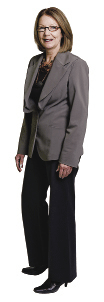
Fern D. Snart, '79 PhD
As a student, Snart was not really aware of LGBTQ issues on campus. But that changed when she took on the role of the Faculty of Education's associate chair of undergraduate programs in the mid-90s.
"Someone asked if I would put this sticker on my office door - I guess it would be like a Safe Spaces sticker now. I was quite affected by a couple of students who happened see the sticker and shared their stories with me."
It was after Snart took over as dean in 2005 that professor Andre Grace and his team formed iSMSS and propelled it into a community outreach and research program of international acclaim - a university program. "That was the tipping point in me learning about and appreciating the needs on campus."
Allies like Snart are an important part of meeting the needs of the LGBTQ community. "There is always strength and substance in a diverse community. For any group in a minority to find support requires a broadly based community to take actions on important issues."
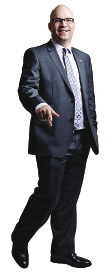
Kris Wells, '94 BEd, '03 MEd, '11 PhD
Assistant professor and associate director of iSMSSWells is proud of how far the university has come since his days as an undergrad.
"In the early '90s there were no basic human rights protections for [the LGBTQ community] in Alberta. It was a dangerous time to be different.… My experience was one of invisibility, where you had to hide who you were to simply survive. As a result, I never spent much time on campus because I never felt fully included or valued for my identity."
Wells found GALOC in his third year and was supported to "come out" during his final semester. "But it wasn't easy; it took great courage to walk into that room and meet other students like me." Now, as associate director of U of A-based iSMSS, Wells is able to help sexual- and gender-minority youth who are themselves seeking support and information.
"Social equality is ... ultimately about cultural change - small changes that lead to a campus culture where everyone can feel safe, supported and fully included."

Alexis Hillyard, '06 BEd, '11 MEd
Hillyard always felt comfortable during her time as an undergrad in the early 2000s, most of which she spent in the Fine Arts Building. "I had a good experience in my course work … campus was an accepting place…. I was pretty sheltered."
But a Safe Spaces survey conducted by iSMSS in 2011 revealed that many students were not aware of the support systems on campus. "One person said, 'I feel really alone.' They didn't know about iSMSS. So we tried to come to the students and say, 'Hey. We're here.' " That led to the organization of Pride Week - a great moment for LGBTQ rights on campus, and a moment of personal pride for Hillyard. "For me, I was most impressed and happy with the way the U of A really rose to the occasion. It was super present.
"I was really proud of my university."
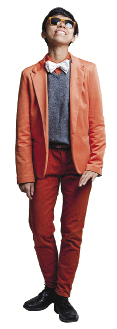
Linh Lu
"I identify as being gender queer, an umbrella term used where a person's gender identity is not the same as their biological sex. I don't identify with either end of the male/female spectrum. It's more like an absence of gender. It is a very new concept for people, and … I feel like I am still very new to it.
"When I first started on campus in 2007, I was in the Faculty of Engineering, and I found that trying to share [my gender and sexual orientation] was difficult. So I learned not to talk to people about it. Eventually I found different outlets, including OUTreach. I have since changed over to an arts major.
"Campus is very much like home to me. Pride Week was a big statement of solidarity, and there are talks about a gender diversity centre within the Students' Union.
"Now we have momentum. There are more and better things to come."
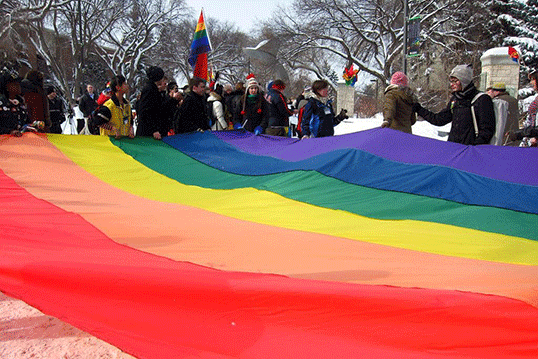
We at New Trail welcome your comments. Robust debate and criticism are encouraged, provided it is respectful. We reserve the right to reject comments, images or links that attack ethnicity, nationality, religion, gender or sexual orientation; that include offensive language, threats, spam; are fraudulent or defamatory; infringe on copyright or trademarks; and that just generally aren’t very nice. Discussion is monitored and violation of these guidelines will result in comments being disabled.